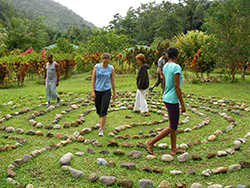 Walking a labyrinth can be a profound experience. In our town, we have a simple labyrinth, marked on the earth with stones in a circle of redwoods. I love to walk it, using it as a moving meditation.
There are many ways to walk a labyrinth. You can find very specific instructions for what to do as you walk one - even eHow has a page on how to walk one.
Walking a labyrinth can be a profound experience. In our town, we have a simple labyrinth, marked on the earth with stones in a circle of redwoods. I love to walk it, using it as a moving meditation.
There are many ways to walk a labyrinth. You can find very specific instructions for what to do as you walk one - even eHow has a page on how to walk one.
I like to approach labyrinth walking more casually, without a set procedure. Sometimes I set an intention, but more often I simply start to walk and see what experiences it brings. It always takes me out of linearity. We are so accustomed to seeing life - our hours, days, years - as a line that progresses from one place to another. The latter place is usually a goal. We try to find the straightest way to the goal. We measure the distance in our minds. If it's a car trip, we watch our progress on a map. But getting to the center of a labyrinth is like the "long and winding road". You come closer to the center and your mind may start to try to measure how close you are to the "end". Just then, you find yourself taking a turn that leads you back out toward the edge.
For me, the labyrinth mirrors life, which isn't really linear. Walking it is a great way to relax into the twists and turns of life, to let go of the constant focus on future goals and the tendency to try to see how everything leads to something else. It's a way of being in the Now. Martha Cuffy, who is seen in the photo walking a labyrinth with friends, expressed similar sentiments in a lovely post with a perfect title - Walk your Life in a Labyrinth.
I was inspired to write this post by Eleanor, a seminary student in Hong Kong, who left a beautiful comment on the website about her experience walking the labyrinth. It's moving and inspiring to read how she uses her walk in the labyrinth to process emotions and gain insights into herself and her life. She has quite an inner journey, and comes out of it with beautiful observations on the nature of silence. This is a beautiful example of the power of walking the labyrinth. Not every walk will be this profound - one needs to let go of expectations and see what special gifts the labyrinth holds each time it is walked.
Have you walked a labyrinth? What was the experience like for you?

